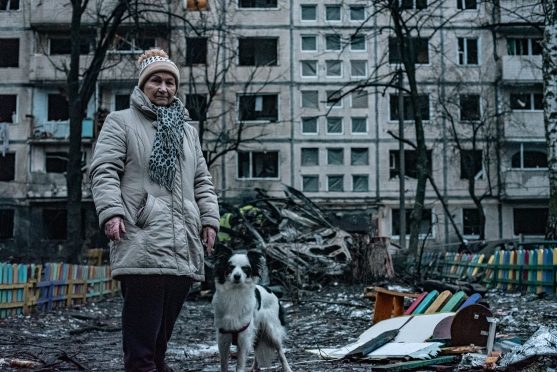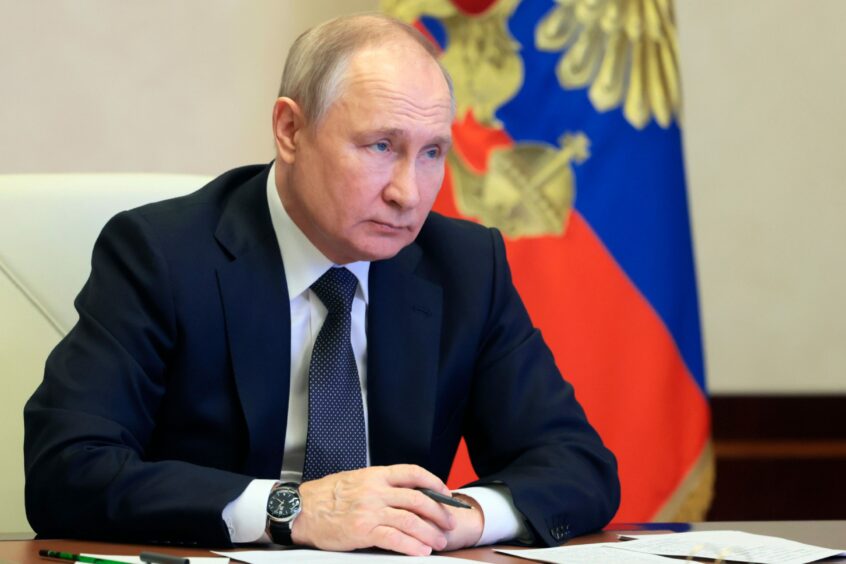
Minutes after the Ukrainian president met his US counterpart in Washington on Wednesday, Russian missiles slammed into Kyiv, the first such attack on the capital in months.
It was just after 3am local time when explosions shook the city. Ten ballistic missiles were shot down by air defence units, authorities claimed, but debris crashed into residential flats and a nursery school, wounding more than 50 people.
Volodymyr Zelensky had been in Washington to urge Congress to approve the $61 billion funding package facing stiff opposition from Republicans, amid wavering support in the West for Ukraine’s fight. He did not succeed.
The attack on the capital was only one in a series of strikes against Ukrainian cities. Late last week the northeastern city of Kharkiv was hit by six missiles fired from Russia’s bomber fleet, with one person killed.
On Thursday the Black Sea port of Odesa was subject to a massive wave of Shahed bomber drones, with 11 people – including three children – injured.
Meanwhile Russian forces have been attacking south and east
Ukraine. A confident Vladimir Putin on Thursday vowed to continue the war, saying there would be no peace until the original aims of the war were achieved: what Russia calls the denazification and demilitarisation of its neighbour. But just as Russia targeted cities and energy infrastructure in an apparent revival of last year’s winter tactics, international solidarity seemed to be fading. Crucial EU aid worth £43bn was blocked by Hungary last week, while Slovakia’s new prime minister Robert Fico ended military aid for Ukraine when he took office last month.
In Kyiv, as people salvaged items from their bomb-damaged homes on Wednesday, there was a real sense of anger over developments in the west. “I wish we weren’t denied support,” said Oleksandr Kisel, who lives nearby and saw the huge blaze break out after the rocket debris struck. “What’s happening in America is very bad, what Hungary and Slovakia are doing is wrong. If we don’t beat Russia now, if we don’t put Russia in its place, this will be the future for all European countries,” Kisel warned.
He talked to The Sunday Post outside the worst-hit block of flats in Kyiv’s Dniprovs’kyi district, standing next to the rocket’s impact crater. Twisted wrecks of cars lay scattered around the children’s playpark, and in the nursery school opposite workers were throwing debris into a skip.
At an adjacent block Nataliia and Oleksandr Kozhusko pointed up at their third-floor balcony – all the windows were blown out. No sirens sounded before the explosion, she said – these missiles are hard to detect on radar, so there’s often no warning – and the couple grabbed a blanket and ran to the bathroom.
“It happened so fast,” Nataliia, 45, said. “With ballistic missiles it’s immediate, everything instantly bursts into flames.”
Valentina Khomenko, a retired geologist, was walking through the debris, taking her dog for a walk. She will be 80 years old in January, she said, and had buried her husband earlier this year – a heart attack, brought on by the prolonged stress of the war. At 3am she’d been in her flat with her 13-year-old grandson. “We woke up to a terrible rumbling,” she said, “then a very scary explosion, then two more. Black smoke and a fiery glow.”
Her grandson had experienced all this before – when the full-scale invasion began on February 24 2022 he lived near Hostomel, on the 21st floor of a high-rise, right in the path of the Russian tanks and bombers. So when they woke to explosions on Wednesday he burst into tears. Later, Valentina had tried to calm him by running a hot bath, but the hot water was cut off. Now, she said, she wished she hadn’t come back to Kyiv. “We lived in the Netherlands for almost a year and half, but we returned in August. It was relatively calm here.”
As darkness fell, Tetyana Lohvynenko waited outside the entrance to her block. The young editor of a Ukrainian news site, she had been at home with her 56-yearold mother when the rocket fell right outside their third-floor windows.
“Mum, it’s ballistic!” she’d yelled, having grabbed her phone and run into the hallway after the first blast. “Then there was a deafening explosion – it’s hard to describe, but a blast wave, very loud and very dense. You feel the wave coming at you.”
Lohvynenko described how she saw her mother lying in the hallway – she’d been thrown out of bed by the blast, and pinned down by a balcony door which flew off its hinges. At first, Lohyvynenko thought, they should stay put, wait it out in the hallway. But the fire outside was becoming huge.
“Something was blazing, billowing smoke, and something kept exploding, but it was unclear what. When we could see the red flames I said – ‘Look, we should probably get out’. And that’s when I felt these warm trickles. I said, ‘Mum, don’t freak out, but I think I’ve been cut in the head a little bit’. But actually we were both covered in blood. The whole hallway was covered in blood.”
Tetyana bent her head to show the bloody gashes on her scalp, and cuts on her eyelid and face. She’d been treated at a hospital, and her mother was still there, badly bruised by the door’s impact. The flat, she said, was wrecked. Full of shattered glass and bits of window frame, pools of blood everywhere. “It’s impossible to imagine,” Lohvynenko reflected. “It will never be as you imagined, it’s 1,000 times worse. You’re separated from death by some microscopic fraction of a second.”
Ukraine may be at war, but there had been few attacks on the capital in recent months, and the attacks have stunned Kyiv residents.
Security expert Maria Avdeeva described the situation in Ukraine as critical. “I don’t want to sound pessimistic but we are already in the phase now when we have to act very quickly to stop Russia, because they are gaining power. We have already passed that point when it was possible to say ‘Let’s do this, it will stop Russia’ – no, Russia will not stop now.
“It looks like Putin is preparing his population for another several years of war. And it will probably not just be Ukraine,” she said.

Enjoy the convenience of having The Sunday Post delivered as a digital ePaper straight to your smartphone, tablet or computer.
Subscribe for only £5.49 a month and enjoy all the benefits of the printed paper as a digital replica.
Subscribe © Mikhail Metzel/AP/Shutterstock
© Mikhail Metzel/AP/Shutterstock